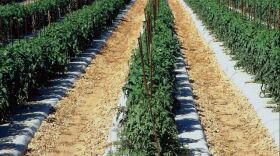Agriculture is big business in Texas. Statewide, it has a $100 billion dollar economic impact.
But the industry may be at risk. The average age of a Texas farmer or rancher is 59. And fewer young people are taking over the labor-intensive work.
The U.S. Department of Agriculture has set up a program to assist aging agricultural workers in Texas. They’ve also identified a population that may be well-suited for taking over the work – veterans.
Erin Pilosi travels the state to tell people about Texas AgrAbility. Her job is talk about the assistance available to Texas agriculture workers who need it.
“It can be anything from being quadriplegic to having arthritis," Pilosi says.
Texas AgrAbility then works with organizations to help farmers keep farming, whether it’s putting a lift on a tractor for a person in a wheelchair or adding more steps and handrails to a combine for someone with a bad back – or something else entirely.
“I have a producer who is mostly deaf and he raises goats," Pilosi says. "Well, he can’t hear his goats when his goats are in trouble. So, right now, we’re working with another agency that trains farm dogs. Specifically, they will train that dog to meet his needs that can alert him when his goats are in trouble. We do all sorts of different things.”
About half of U.S. military veterans are from rural areas. Some have an interest in agriculture but may be dealing with injuries or trauma – and that’s where Texas AgrAbility comes in again.
“It is still possible for them to do farming and ranching," Pilsoi says. "And we have the resources available to help them do that.”
Yvonne Martinez-Higgins and her husband William are both veterans. She was in the army and he was in the air force. Their relationship blossomed when they were both stationed in Hawaii.
They shared a dream to start a family farm.
“We’ve had all kinds of ideas from goats to rabbits to currently butterflies," William Higgins says.
They bought 15 acres in 2005, but William admits not a lot has happened since then.
“It’s a long process," he says. "I’m kind of slow anyway. So it’s trying to plan everything and everything’s kind of been on our own at this point.”
Part of the problem is that it’s hard for William to get around. He walks with a cane, suffers back and hip pain and has issues with balance.
“I wasn’t involved in any direct combat," he says. "Mine was just hard use. I was a lineman. I climbed lots of utility poles, fell off a few of them. I’ve found that mobility is hard for me and also dealing with people I’ve found to be difficult as well.”
Those interpersonal difficulties aren’t uncommon among veterans – particularly those who’ve been to war.
Erin Pilosi says she’s met many veterans who find farming and ranching therapeutic.
“All of the benefits that come with working with the soil and growing things," Pilosi says.
That’s what William and Yvonne hope to get out of their family farm.
“Well, I wouldn’t be my own boss. I’d have her to tell me what to do or direct me anyway," Higgins says. "But it allows me to kind of set my own schedule and hopefully design things that are accessible for me."
"And I do think that he feels also that being able to produce something and to have that ownership, that’s very therapeutic in keeping everything going and working and physically and mentally sharp. And just happy. He’s happiest when he can produce things," Yvonne Martinez-Higgins says.
William and Yvonne hope the Texas AgrAbility program will connect them with tools to help William get around their property easier. And they hope they can give back by providing local goods to Texans.
“I think we’re just really used to hard work that takes a long time," Martinez-Higgins says. "And as long as we have something at the end to show for it, we’re pretty happy with that. If you’ve served your time and you’re willing to continue serving in another capacity, why not go for it?”
Above all, they hope their four kids will carry on the farming tradition they’re working hard to build – and that Texas could be losing if new generations don’t embrace.






